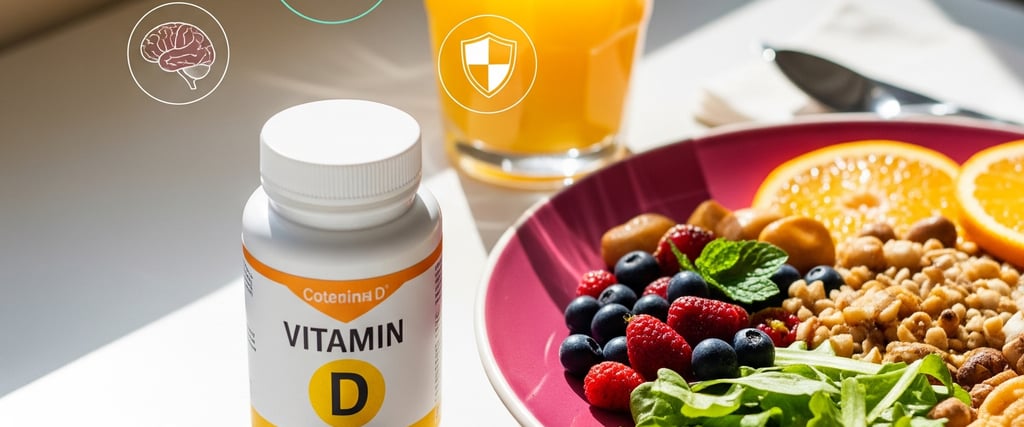Discover eco-friendly deals - Save now!
Vitamin D: The Sunshine Nutrient for Strong Bones and Better Immunity
Vitamin D plays a vital role in maintaining bone health, supporting immune function, and enhancing mental well-being. Despite being naturally produced when exposed to sunlight, a significant portion of the population—especially those living indoors or in polluted environments—suffers from deficiency.
5/8/20242 min read


What Is Vitamin D and Why Is It Important?
Vitamin D helps your body absorb calcium, maintain phosphorus levels, and build strong bones.
It modulates immune function, supports mental clarity, and may even influence mood and brain health.
Exists in two main forms:
Vitamin D2 (Ergocalciferol): Plant-based, found in some fortified foods
Vitamin D3 (Cholecalciferol): Animal-based or synthesized; more effective in raising blood levels
Most supplements contain Vitamin D3 due to its higher bioavailability and potency.
Health Benefits of Vitamin D
Strengthens Bones: Helps absorb calcium and phosphorus, preventing rickets (in children) and osteomalacia (in adults)
Boosts Immunity: Enhances immune response, especially against respiratory infections
Enhances Muscle Function: Supports muscle strength, coordination, and recovery
Improves Mood & Brain Health: May help alleviate symptoms of depression, anxiety, and mental fatigue
Who Needs Vitamin D Supplements?
Supplementation may be necessary for:
People with limited sun exposure (e.g., office workers, elderly, those in polluted or high-rise areas)
Individuals with darker skin tones (reduced natural vitamin D synthesis)
Elderly adults or postmenopausal women (increased bone health risks)
People with obesity, liver or kidney disorders, or absorption issues like celiac or Crohn’s disease
Vegans or strict vegetarians (may need D2 or lichen-based vegan D3)
How to Take Vitamin D
Forms Available: Tablets, softgels, sachets, oral sprays, or liquid drops
Typical Dosage:
Maintenance: 600–2000 IU/day
Deficiency treatment: 60,000 IU weekly for 6–8 weeks (under supervision)
Onset of Action: Blood levels often improve within 1–2 weeks of consistent use
Ease of Use: Most formats are easy to swallow; drops and sprays are ideal for children or seniors
Top Vitamin D Brands in India
D-Sun: Convenient weekly sachets of 60,000 IU cholecalciferol
Cipla Calcirol: Clinically trusted and widely prescribed in therapeutic dosages
HealthVit D3: Daily-use, budget-friendly D3 supplement with verified purity and safety
These brands are FSSAI certified, easily available at local pharmacies and online stores, and generally affordable.
Safety Guidelines and Precautions
Avoid Overdose: Excess vitamin D can cause hypercalcemia, leading to nausea, kidney problems, or heart rhythm disturbances
Drug Interactions: Use caution if taking calcium supplements, diuretics, steroids, or heart medications
Medical Supervision: Always test your 25(OH)D blood levels before starting high doses
Follow Doctor's Advice: Particularly important for those with chronic illnesses, pregnancy, or existing supplement regimens
Storage and Suitability
Certifications: FSSAI certified; some brands may carry USP verification
Diet Compatibility: Vegan-friendly options available (D2 or plant-based D3); suitable for keto and gluten-free diets
Allergen-Free: Most products avoid common allergens, but label reading is essential
Sustainability: Many Indian brands use minimal packaging and are locally manufactured
Storage Tip: Keep in a cool, dry place at room temperature, away from sunlight
Scientific Research & Backing
A 2017 BMJ meta-analysis showed that vitamin D significantly reduces the risk of acute respiratory infections, especially in deficient individuals.
Source: Martineau et al., BMJ 2017The NIH confirms that long-term deficiency can lead to bone loss, muscle weakness, and an increased risk of depression and cognitive decline.
NIH Fact Sheet – Vitamin DSeveral studies suggest that vitamin D supplementation improves mood and reduces symptoms in individuals with mild to moderate depression.
Source: Parker et al., Nutrients 2017
Conclusion
Vitamin D isn’t just a nutrient—it’s a hormone-like compound essential for bone health, mental balance, and immune defense. While sun exposure is the most natural source, today’s indoor lifestyles and urban environments make supplementation a smart, often necessary step.
To stay healthy:
Get your levels checked through a simple blood test
Choose a well-tested, appropriate dosage supplement
Always consult a healthcare provider, especially if you face fatigue, low immunity, or bone-related concerns